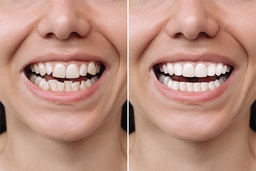Overcome Bad Breath During Fasting with These Effective Ways!

Bad breath, often known as halitosis, is a common problem many people experience during fasting. This condition occurs because saliva production decreases, allowing bacteria in the mouth to grow faster. Other factors, such as certain foods, poor dental hygiene, and certain medical conditions, can also worsen bad breath.
However, don't worry! There are several effective ways to keep your breath fresh during Ramadan. Refer to the tips below.
10 effective ways to overcome bad breath during fasting

1. Brush your teeth properly
Brush your teeth at least twice daily, after suhoor and before bed. Use fluoride toothpaste for 2–3 minutes to remove debris and plaque that cause bad breath.
2. Use floss and interdental brushes
Cleaning between your teeth with dental floss or interdental brushes can help remove food debris that a regular toothbrush cannot reach. This step is vital in preventing bad breath caused by bacteria that grow between your teeth.
3. Clean your tongue regularly
Bacteria that cause bad breath can accumulate on the surface of your tongue. After eating suhoor and breaking the fast, clean your tongue with a tongue cleaner or soft-bristled toothbrush.
4. Avoid foods that cause bad breath
Some foods, such as garlic, onions, and other strong-smelling foods, can worsen bad breath. Consume as few of these foods as possible when breaking the fast and eating suhoor.
5. Drink plenty of water
Lack of fluids in the body can cause dry mouth and trigger bad odors. Drink 8-10 glasses of water between breaking your fast and suhoor to stay hydrated.
6. Limit caffeine and sugary beverages
Caffeinated beverages such as coffee and tea have a diuretic effect that can cause dehydration. Likewise, sugary drinks can increase the growth of bacteria in the mouth. Choose water or herbal tea as a healthier option.
7. Wait before brushing your teeth after eating
Wait about 30–60 minutes after breaking your fast before brushing your teeth. It is crucial to give saliva time to neutralize the acid in food while protecting tooth enamel.
8. Gargle with salt water
Gargling with a salt water solution can help kill bacteria in the mouth and reduce gum inflammation. Mix one teaspoon of salt in warm water and gargle for 30 seconds.
9. Use an alcohol-free mouthwash
Mouthwash containing alcohol can actually dry out your mouth. Choose an alcohol-free mouthwash to help reduce bacteria without causing side effects such as oral dehydration.
10. Visit your dentist regularly
Don't forget to visit your dentist before and after Ramadan. Regular dental checkups can help detect oral health problems that may be causing bad breath, such as cavities or gum disease.
Causes of bad breath during fasting

In addition to the lack of saliva production, several other factors can also worsen bad breath during fasting, including:
- Dry mouth is caused by reduced saliva flow, which cleans the mouth of bacteria.
- Lack of oral hygiene, such as not brushing your teeth or cleaning your tongue properly.
- Dental and gum problems include cavities, excess plaque, or gum disease.
- Consumption of certain foods, such as garlic, onions, and other strong-smelling foods.
- Certain diseases include GERD, diabetes, liver disorders, kidney disease, and respiratory infections.
Keep your breath fresh during fasting!
Implementing the steps above can help you avoid bad breath and fast more comfortably. Remember to take care of your dental and oral health during Ramadan.
If you experience bad breath that doesn't get better, consult a dentist at GWS Medika Permata Hijau and GWS Medika Blok M Medical Center for the right treatment.
Let's start healthy habits now to keep ourselves fresh all day!



